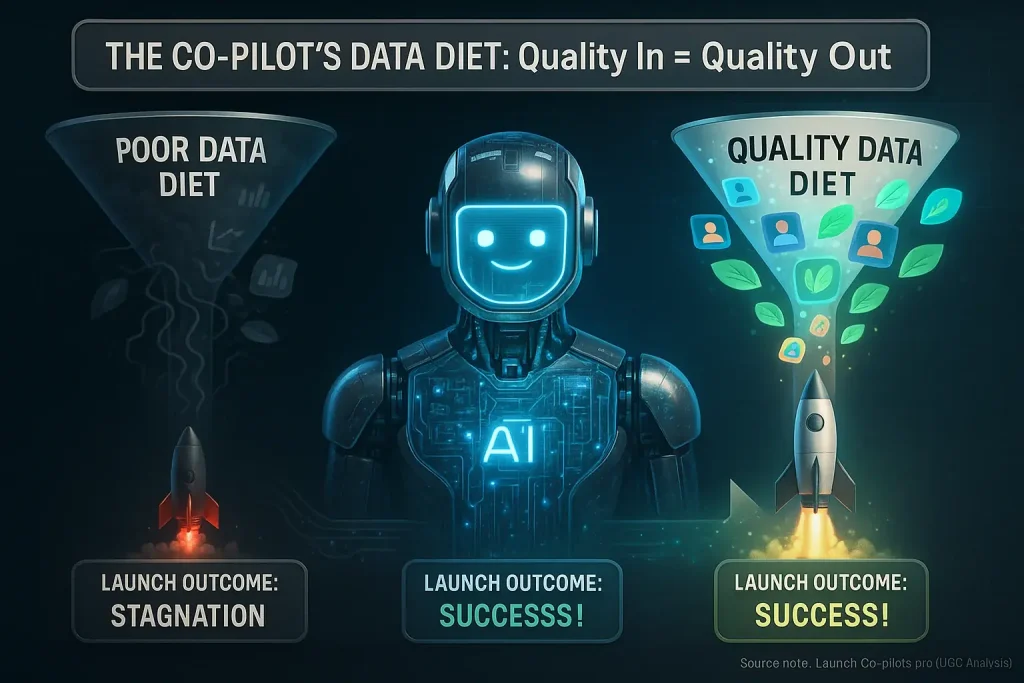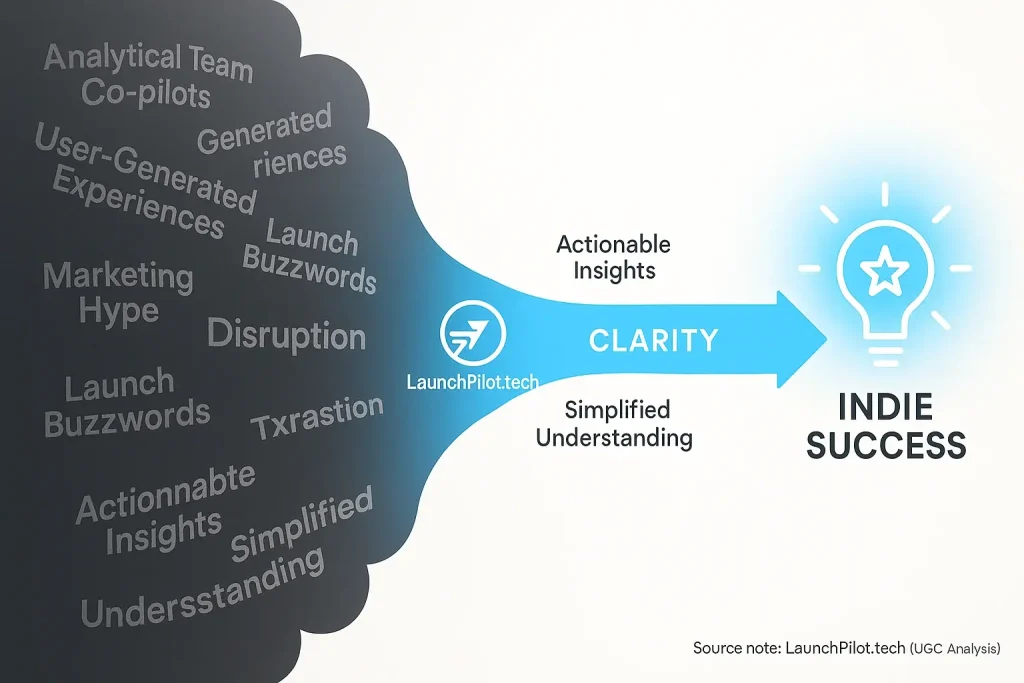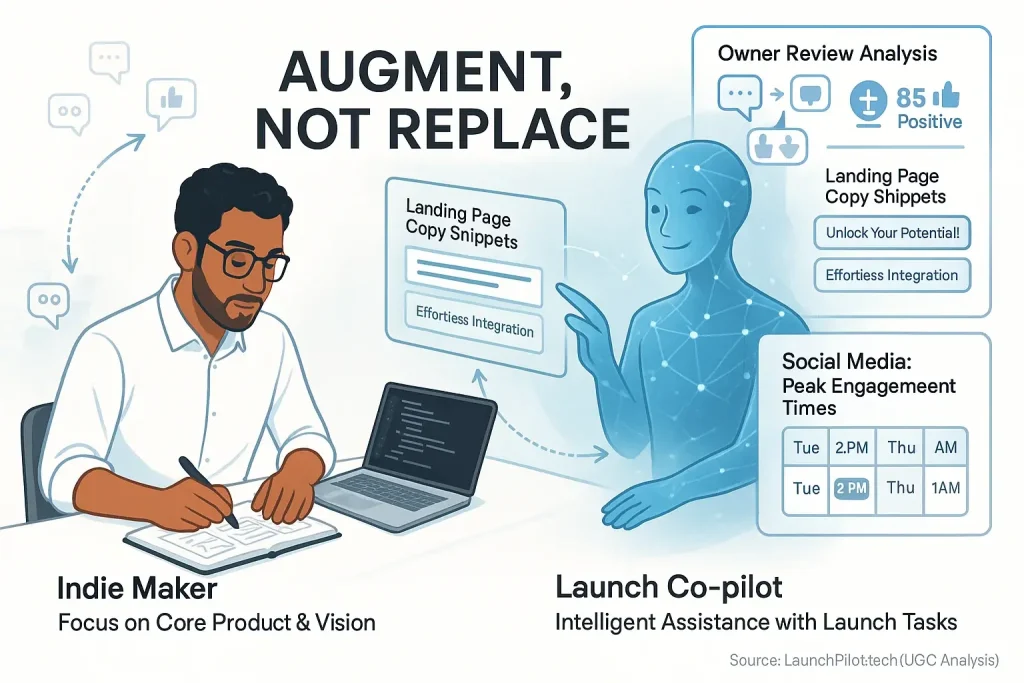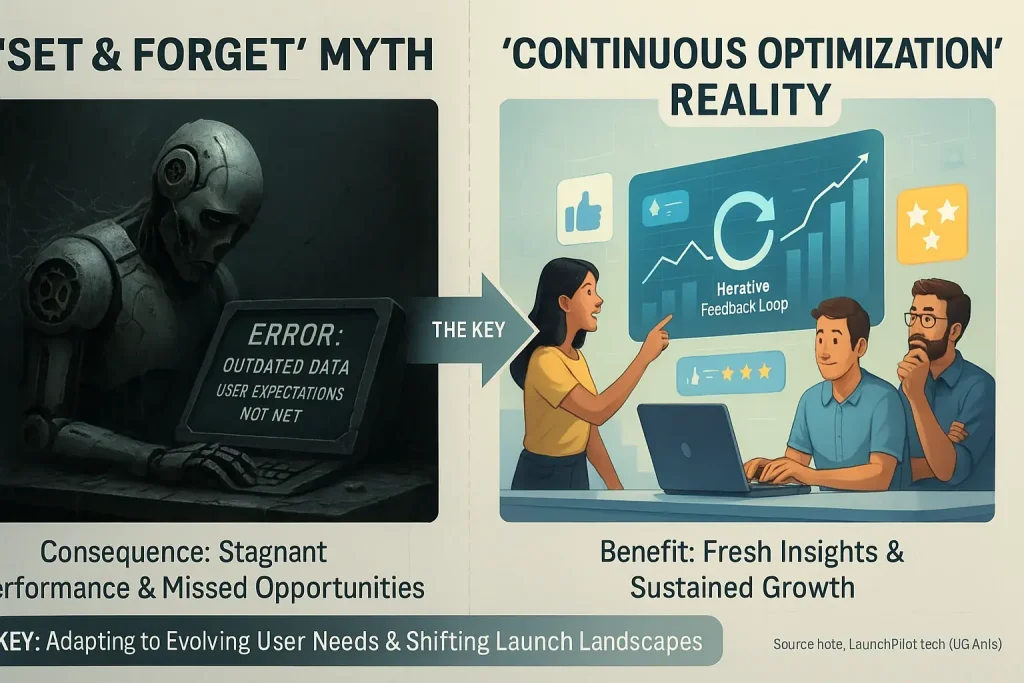Beyond the Hype: Why Real Indie Maker Stories Matter (And What We're Uncovering)
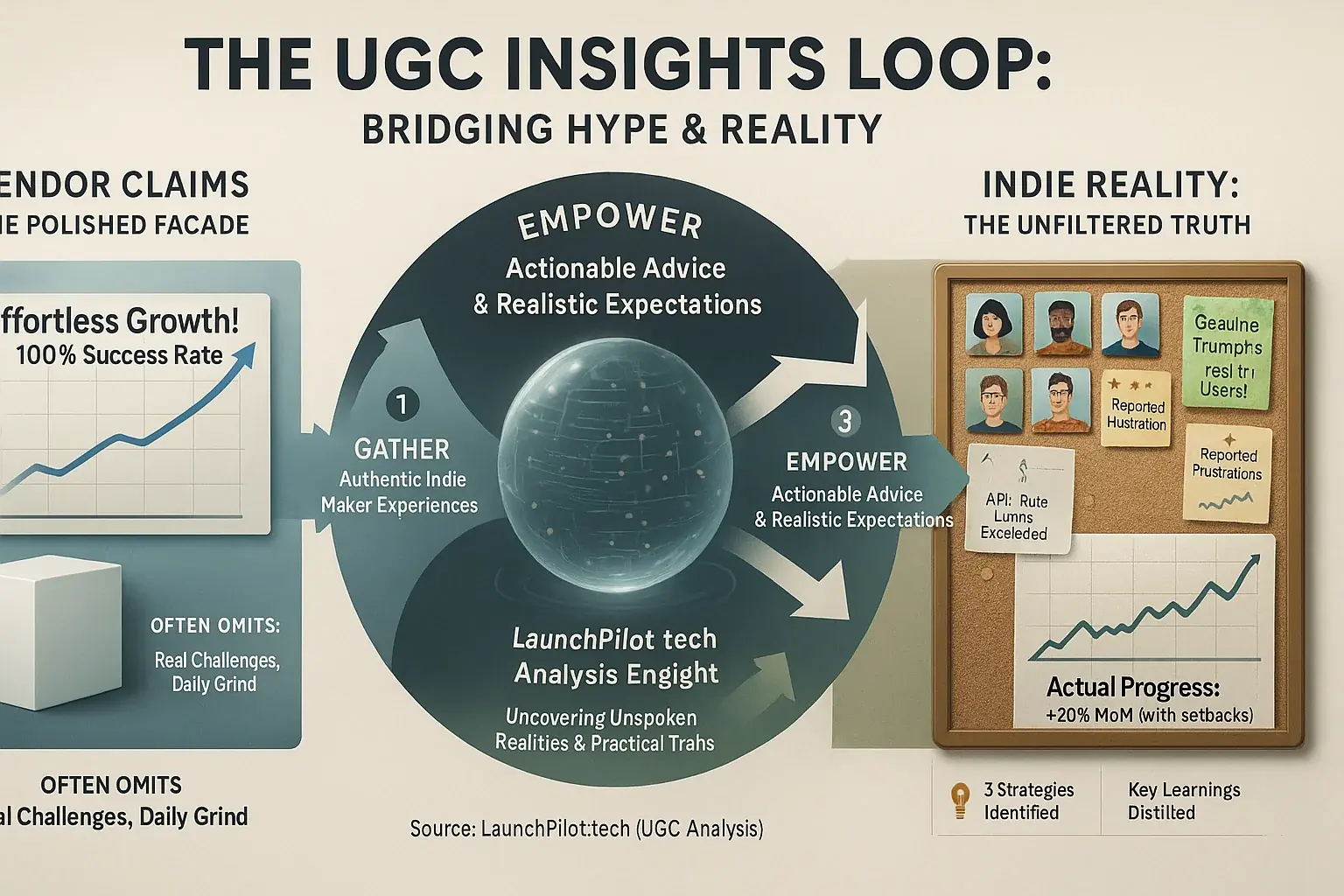
Vendor case studies often present a polished view. Does this match your daily indie grind? Probably not. Real understanding comes from real indie maker experiences. LaunchPilot.tech dives deep into this user-generated content. We uncover the practical truths hidden within thousands of community discussions about launch co-pilots.
Our analysis of aggregated user experiences uncovers many unspoken realities. Indie makers consistently share surprising practical moments with these tools. These are the vital details often absent from marketing narratives. LaunchPilot.tech synthesizes these diverse accounts into collective indie case studies. You see the unfiltered journey. This includes genuine triumphs and frequently reported frustrations.
What will you find here? Practical lessons. Realistic expectations for your own projects. Actionable strategies emerge directly from the indie launch community's collective wisdom. Learning from shared successes and failures is powerful. These community-driven insights can significantly shape your own approach to product launches.
SaaS Launch with AI Co-pilots: The Highs, the Lows, and the Lessons Learned (UGC Stories)
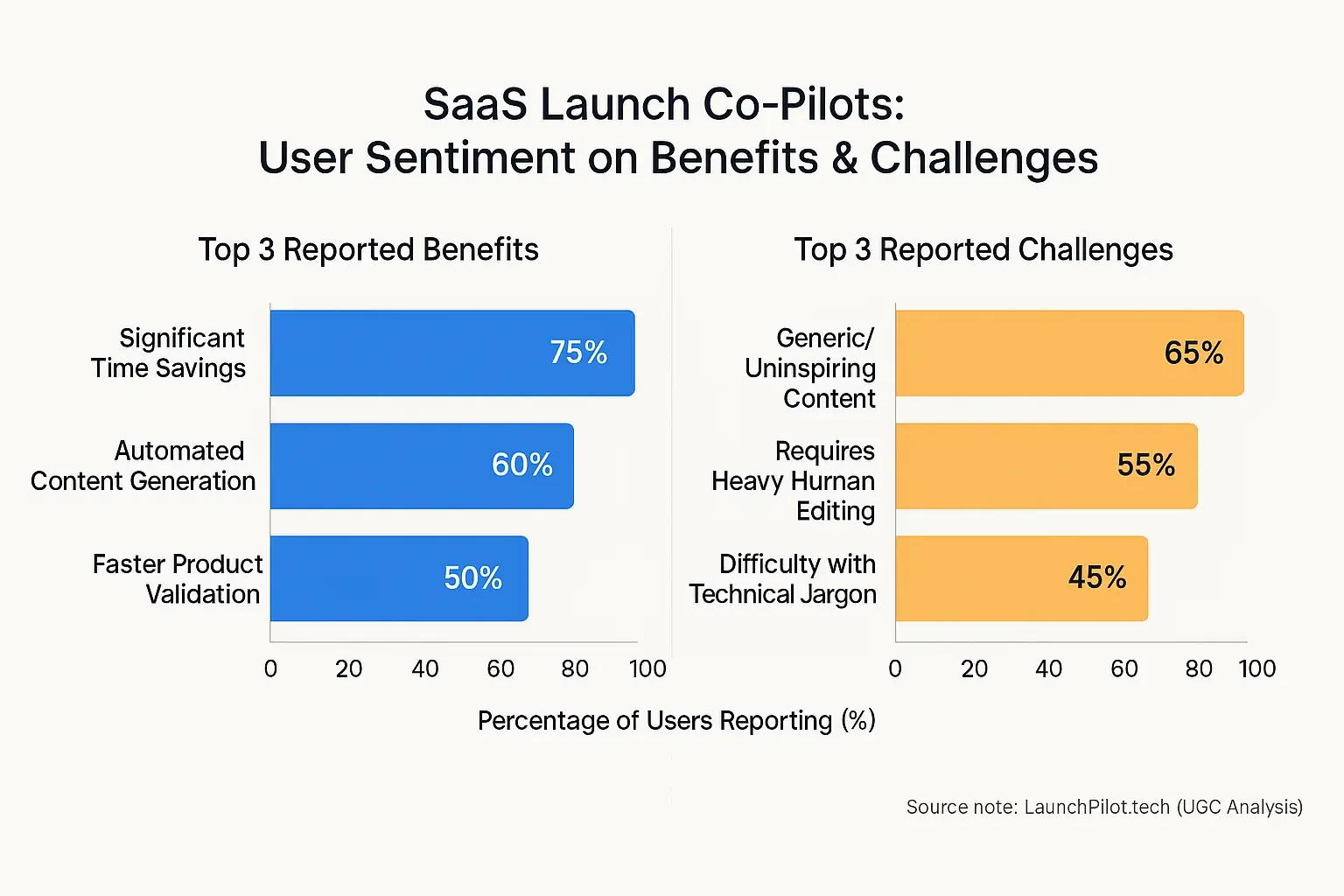
SaaS launches present unique hurdles for indie makers. Our analysis of hundreds of indie SaaS launch stories reveals feedback co-pilots are increasingly used. These tools automate demanding early-stage tasks. Many SaaS founders report significant time savings. Imagine 'Alex', an indie developer. Alex launched a niche SaaS product. A feedback co-pilot helped automate initial email outreach. It also drafted core landing page copy. The result? A surprisingly engaged waitlist. Validation happened much faster than Alex anticipated.
But it's not all smooth sailing. Many indie makers share cautionary tales. Another indie, 'Ben', found their feedback co-pilot struggled. Highly technical SaaS jargon created problems. The co-pilot generated generic, uninspiring content. This output required heavy human editing. Unexpected time sinks often followed. A key takeaway from SaaS indies, observed across extensive user discussions? Feedback co-pilots excel at scaling known content patterns. They often falter with truly novel or disruptive SaaS concepts. Meticulous human guidance becomes absolutely essential in these cases.
So, what are the practical lessons for SaaS builders using these tools? Synthesized indie maker feedback shows co-pilots genuinely shine for specific tasks. Initial content generation is a strong suit. Basic email outreach automation also gets positive mentions. However, human oversight remains critical. Nuanced messaging for a specific audience demands a human touch. Deep technical accuracy in content requires careful review. Our findings indicate balancing co-pilot efficiency with human precision is crucial. This balance consistently underpins SaaS launch success.
Digital Product Launches with AI: Courses, Ebooks & Templates (Creator Insights from UGC)
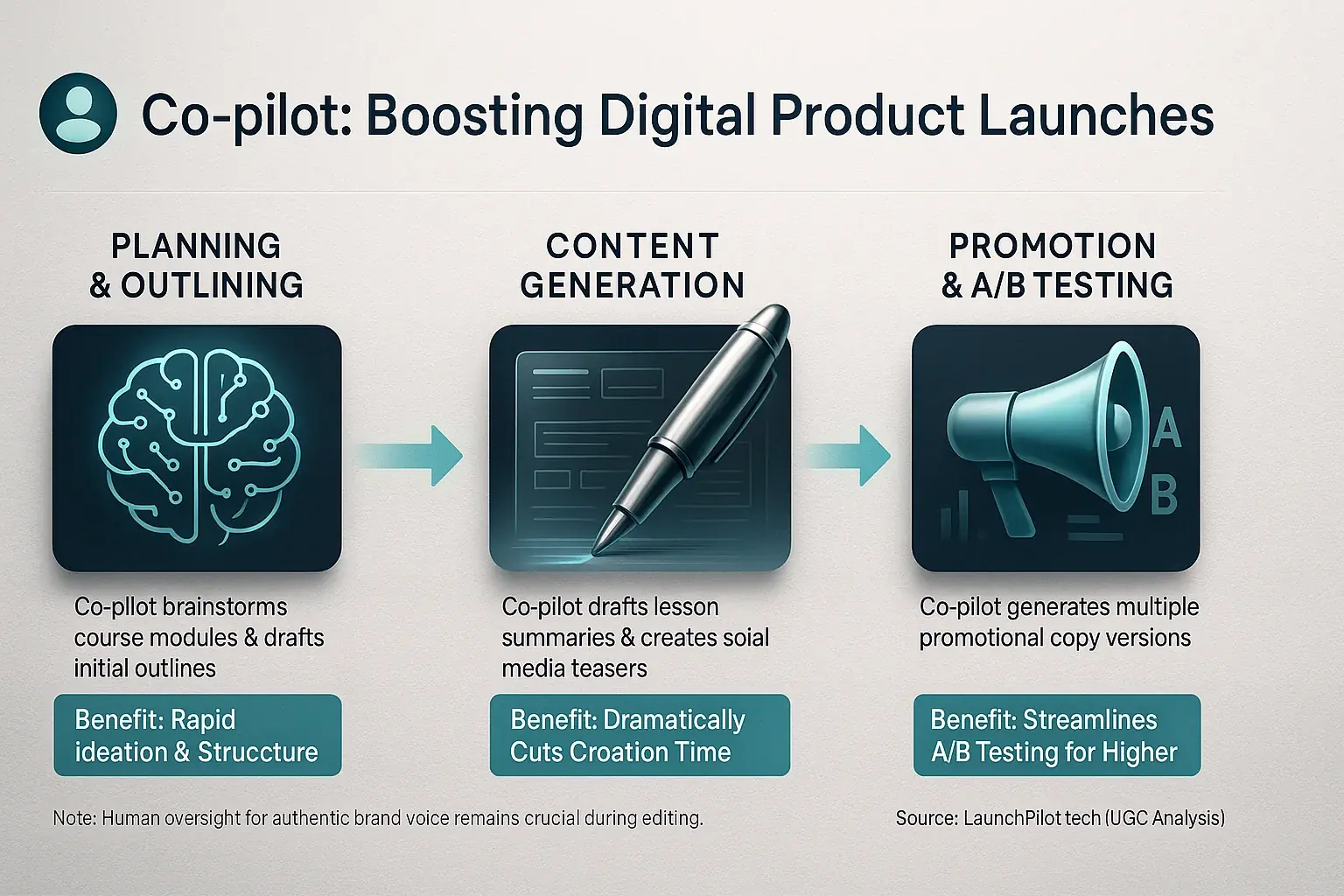
Digital product launches often mean massive content needs. Audience building also demands constant creator attention. Many indie makers, like 'Chloe' from our user review synthesis, found a way. Her user reviews co-pilot brainstormed course modules, drafted lesson summaries, and created social media teasers. This dramatically cut her content creation time, letting her focus on teaching.
But, it's not always straightforward. We saw creators like 'David', an ebook author whose feedback we analyzed, report that content from his user reviews co-pilot lacked his unique voice or deep niche expertise. This frequently led to extensive rewrites, sometimes offsetting the initial time gains. The surprising part from our analysis of indie creator discussions? Many found these user reviews co-pilots, drawing on patterns from aggregated customer feedback, brilliant for creating multiple promotional copy versions, streamlining A/B testing significantly.
The key takeaway for digital product creators? Our analysis of indie creator discussions shows these user reviews co-pilots accelerate content generation for outlines, drafts, and promotional materials. Yet, preserving your authentic brand voice usually requires dedicated human oversight during editing. This balance between analytical shows efficiency and human touch appears critical for success with digital products. Many creators also report using these co-pilots to automate elements of their sales funnels, saving precious time.
Mobile App Launches with AI: ASO, Beta Testing & User Acquisition (Indie Dev Experiences)
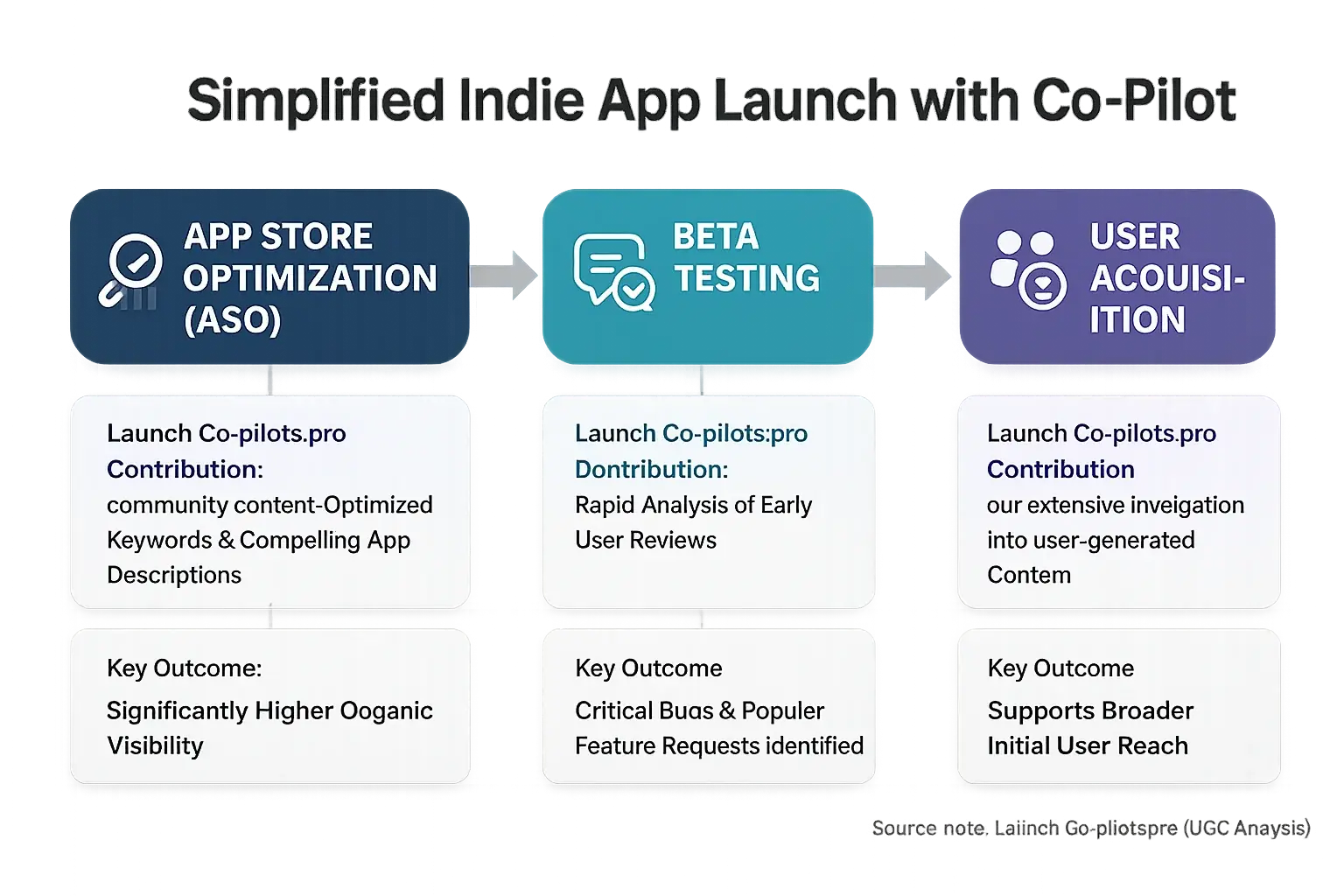
Mobile app launches present unique hurdles for indie developers. The digital marketplace is incredibly crowded. User experiences co-pilots can offer a distinct advantage here. Consider 'Sarah,' an illustrative indie app developer often mentioned in community success stories. Sarah used her feedback co-pilot to optimize App Store Optimization (ASO) keywords. The system also helped generate compelling app descriptions. This approach, frequently echoed in developer forums, resulted in significantly higher organic visibility. More beta sign-ups followed, surpassing her previous launch attempts.
However, our investigation into user-generated content also uncovers challenges. Some developers, much like a hypothetical 'Mark,' found co-pilot driven user acquisition campaigns struggled with very niche app audiences. This pattern often led to inefficient ad spend. Heavy manual refinement became essential for these developers. This highlights a common limitation: automated systems sometimes miss deep niche nuances. A less talked-about benefit, though? Our analysis of developer feedback shows these tools can be game-changers for quickly analyzing early user reviews. They help identify critical bugs or popular feature requests, turning raw feedback into actionable development tasks almost overnight.
So, what are the key lessons for app indies from all this community-reported experience? Analytical feedback co-pilots demonstrate significant power in boosting ASO. They also aid initial user acquisition efforts effectively for many. Yet, our findings indicate that deep niche targeting often requires persistent human oversight. The interpretation of complex app performance data, especially for unique app categories, still benefits immensely from that experienced human touch. Developers consistently report that the most successful strategies blend co-pilot efficiency with their own deep market understanding.
The Unspoken Patterns: What Makes AI Co-pilot Launches Succeed (or Fail) for Indies?
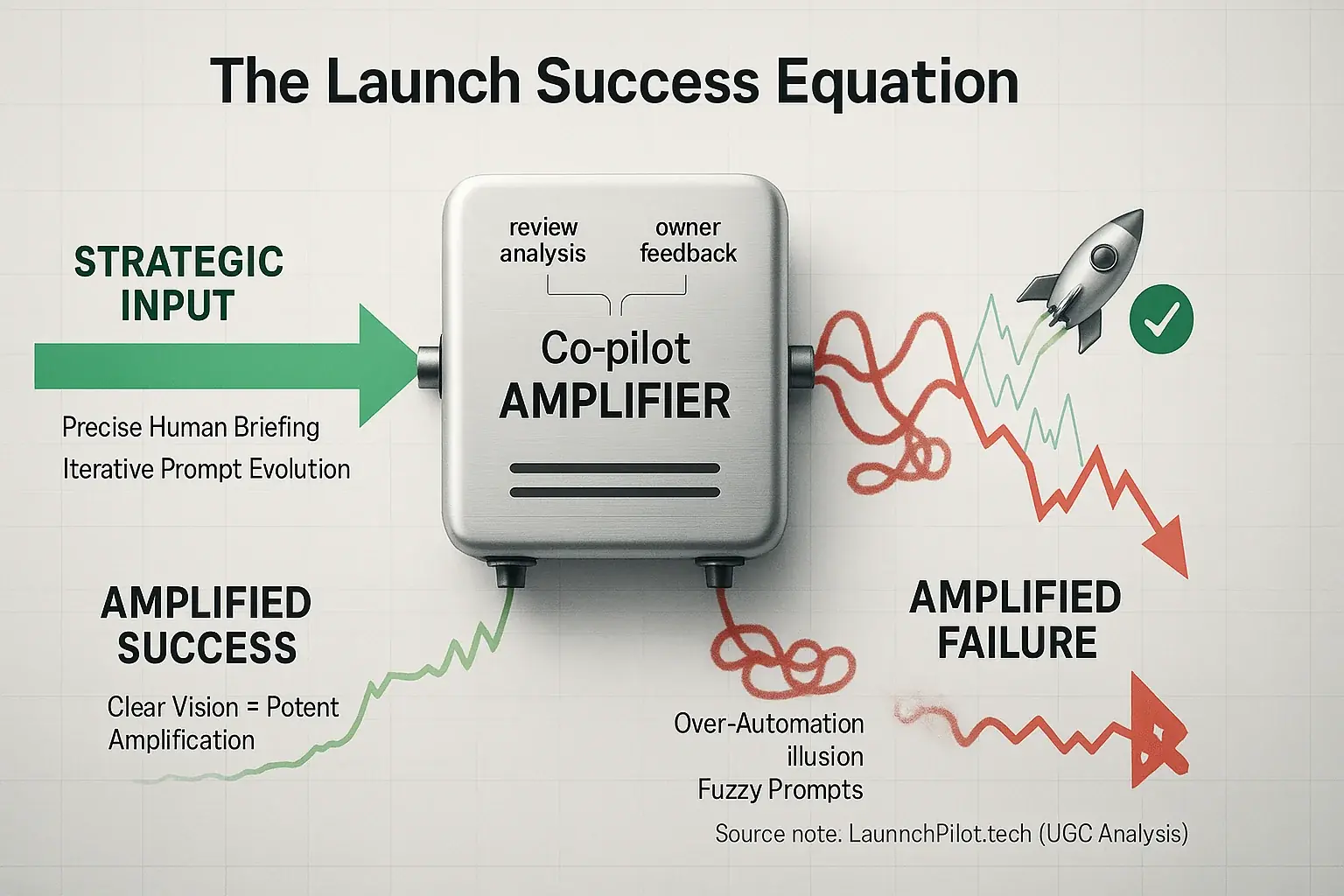
We've sifted through countless indie maker experiences with analytical feedback co-pilots. Clear patterns emerge from this collective wisdom. The specific co-pilot chosen is one piece. How you wield these tools for your launch? That's the real game-changer. Success here isn't accidental; user discussions highlight repeatable strategies.
What truly makes analytical feedback co-pilots work for indie launches? Our synthesis of user experiences points to recurring success strategies. These are not secrets, just smart habits observed across the community.
- ✅ Precise Human Briefing: Makers submitting detailed, unambiguous prompts consistently received higher quality co-pilot output. It’s like giving a brilliant specialist exact project requirements.
- ✅ Iterative Prompt Evolution: The most effective indies, according to numerous user reports, treat prompt development as a refinement cycle. They test. They adjust. They see better results.
- ✅ Focused Automation Goals: Pinpointing specific tasks for the co-pilot, rather than attempting universal automation, led to more impactful assistance. Users found this approach more manageable and effective.
- ✅ Grounded Co-pilot Expectations: A common thread in positive feedback was understanding the co-pilot as an augmenter, not a replacement for human strategy. This mindset reduced friction significantly.
Conversely, what derails indie makers using these co-pilots? Our deep dive into user-generated content uncovers frequent missteps. Avoid these for a smoother launch, based on widespread community experience.
- ❌ The All-Automation Illusion: Makers attempting to automate everything with their co-pilot often reported bland, generic results. This approach usually meant more manual fixing later, not less.
- ❌ Fuzzy Prompts, Fuzzy Logic: A very common story involved vague instructions leading to unhelpful co-pilot output. The machine can't guess your intent, users consistently found.
- ❌ First-Try Fallacy: Expecting perfection from an initial prompt was a setup for disappointment, many experiences showed. Co-pilot refinement through testing is essential, not extra.
- ❌ Absent Human Steering: Letting the data reviews tool run without ongoing human direction often created off-target content. Recalibrating then became a significant burden for many indies.
The biggest 'aha!' moment from extensive user discussions? These data reviews don't replace your critical thinking; they amplify it. Good input creates amplified good. Bad input makes an amplified mess.
So, the core lesson from thousands of indie maker experiences is clear. Analytical feedback co-pilots are potent amplifiers of your input and strategy. They magnify good practices. They also magnify flawed approaches. Understanding these observed success and failure patterns is absolutely key. This knowledge empowers you to truly harness their capabilities for your launch.
Your Action Plan: Key Takeaways for Your Next AI-Assisted Indie Launch
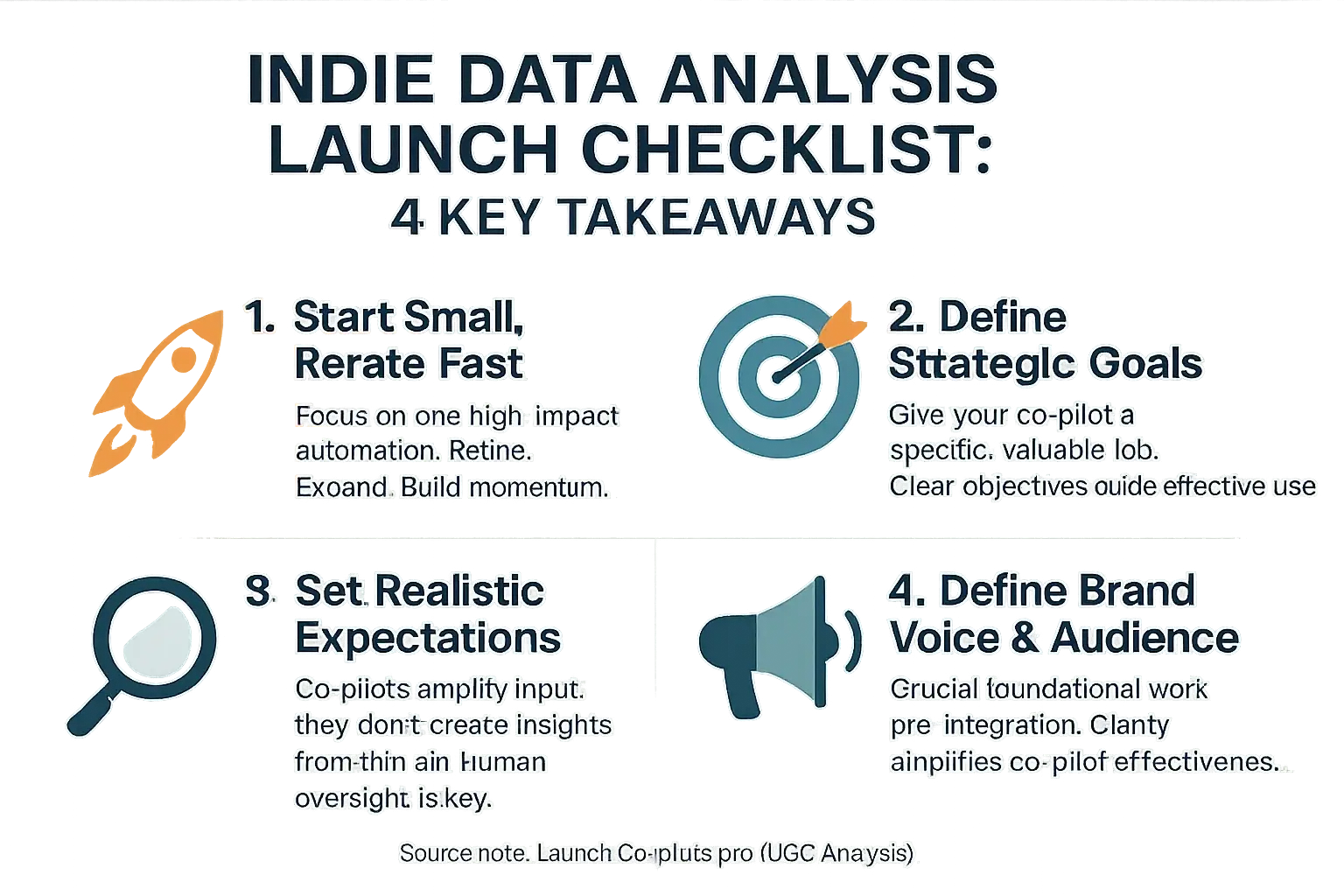
So, what does all this mean for your next product launch? How can you sidestep the common pitfalls? How can you mirror the successes our analysis of user-generated content reveals? Learning from the collective journey of indie makers offers a genuine shortcut. Their reported experiences illuminate your path forward.
- Start Small with Reviews Automations. Iterate Fast. Community wisdom consistently shows grand plans for full user review data automation often stall. Focus your consensus experiences Launch Co-pilot on one high-impact 'our reviews automation' task first. Refine it based on real outputs. Then, you can expand. Quick, focused wins build crucial momentum and practical learning.
- Define Strategic Goals Before Integration. Many indie makers report wasted effort and resources. This often happens when their user analysis co-pilots lack precise direction for the launch. Your analytical feedback tool needs a specific, valuable job to perform well. Clear objectives guide effective use.
- Set Realistic Expectations for Co-pilots. User consensus confirms these analytical tools amplify your input; they don’t create insights from thin air. Understand their role clearly. They are powerful assistants for sifting through user feedback, not autonomous strategists for your brand. Human oversight remains key.
A crucial, often overlooked step emerges from deep dives into indie maker discussions. What is it? Define your unique brand voice. Pinpoint your target audience with absolute clarity. This foundational work, completed pre-our shows integration, is absolutely vital. Synthesized indie maker feedback confirms analytical tools amplify the clarity you provide. They cannot invent authenticity for your consensus team output. This groundwork truly makes all the difference for effective co-pilot utilization.
These lessons come directly from fellow indie creators who have navigated these waters. Apply them smartly to your strategic planning. With careful human input and realistic expectations, consensus experiences Launch Co-pilots can become incredibly powerful partners. Your thoughtful strategy unlocks their genuine potential for your next launch. Successful application is well within your grasp.
Related Insight: AI Co-pilots for Mobile App Launches: From ASO & Beta Testing to User Acquisition (Indie Dev Focus - UGC Driven)
Launching a mobile app solo presents distinct challenges. Indie maker discussions reveal a powerful new ally. data shows co-pilots are that ally.
These tools, guided by collective user experiences, can reshape app store optimization. They sharpen beta testing feedback loops and refine user acquisition. Our upcoming analysis details how these feedback co-pilots can transform your mobile app launch approach.
